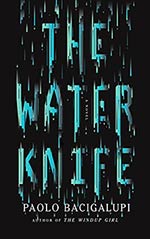
![]() nottheone
nottheone
12/26/2016
![]()
The ideas behind this book are extremely intriguing and I really have to give Bacigalupi kudos for trying to get it through our collectively thick skulls that we are destroying our planet and if we don't do something soon, everything is going to fall apart.
"We're a species that reacts to visceral stimuli. Whatever those visceral stimuli are, we take that as being the general state of the world. If it's raining, it's wet. If it's a drought, it's dry. We don't take in things like 'statistically, every year Lake Mead has gotten lower and lower.' That's not something you experience viscerally."
That quote from a Locus magazine interview with Bacigalupi (April 2016) pretty much explains what the author wants to accomplish with this book. The characters are placed in the American southwest of a near future where water is getting scarcer every day. Nevada, California and Arizona operate like sovereign states--actually, more like criminal syndicates--that spend most of their time figuring out ways to steal water from each other.
We see this world through the eyes of three main viewpoint characters. Lucy, a Phoenix-based journalist who is investigating the death of a friend who claimed to have found some new water rights. Maria, a refugee from Texas where things are apparently even worse than in Arizona, who is struggling just to get enough money for rent, food and water for the next few days. And Angel, a thug who enforces water rights for his chosen gang, which happens to be the Southern Nevada Water Authority.
Anything Bacigalupi writes is head-and-shoulders above most of what gets published, so this was a solid 4 star read for me. His depictions of digitally monitored, Red Cross water stations for the poor and gleaming, waterfall-strewn arcologies for the rich ably contrasted the lifestyles and compromises that would need to be made in a waterless area where the temperature regularly hovers around 120 degrees. The focus on Latino characters and culture was appropriate for the setting and also a welcome break from the usual scifi monotony of whiteness.
However, while reading The Water Knife I didn't experience the oppressive heat or the unique culture of the American southwest quite as fully as I did the sweltering humidity and rich smells of Bangkok while reading the Windup Girl. More immersive descriptions, more compelling characters and a plot that didn't get repetitive and kind of predictable at the end would have made it a 5 star read.
[I listened to this as an audio book performed by Almarie Guerra. I liked that she had a hint of a Latino accent but thought she could have given the book a bit more excitement]